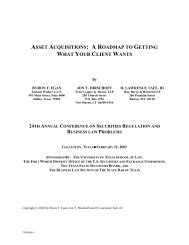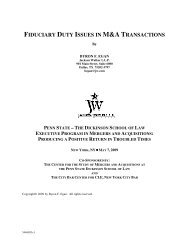busted m&a deals headed for litigation - Jackson Walker LLP
busted m&a deals headed for litigation - Jackson Walker LLP
busted m&a deals headed for litigation - Jackson Walker LLP
You also want an ePaper? Increase the reach of your titles
YUMPU automatically turns print PDFs into web optimized ePapers that Google loves.
e Fulghum Constr. Corp., 872 F.2d 739, 743 & n.5 (6th Cir. 1989) (stating that, in the<br />
bankruptcy context, the relevant standard is “the business practices which were unique to the<br />
particular parties under consideration and not to the practices which generally prevailed in<br />
the industry,” but acknowledging that “industry practice may be relevant” in arriving at a<br />
definition of “ordinary business terms”). But see In re Yurika Foods Corp., 888 F.2d 42, 44<br />
(6th Cir. 1989) (noting that it might be necessary to examine industry standards as well as<br />
the parties’ prior dealings to define “ordinary course of business”); In re Dant & Russell,<br />
Inc., 853 F.2d 700, 704 (9th Cir. 1988) (applying, in the bankruptcy context, a “horizontal<br />
dimension test” based on industry practices); In re Hills Oil & Transfer, Inc., 143 B.R. 207,<br />
209 (Bankr. C.D. Ill. 1992) (relying on industry practices and standards to define “ordinary<br />
course of business” in a bankruptcy context).<br />
The Model Agreement definition distinguishes between major and routine matters<br />
based on the historic practices of both the Seller and others in the same industry and on the<br />
need <strong>for</strong> board or shareholder approval. The definition is derived primarily from the analysis<br />
of “ordinary course of business” in bankruptcy, which examines both the past practice of the<br />
debtor and the ordinary practice of the industry. See, e.g., In re Roth Am., Inc., 975 F.2d<br />
949, 952-53 (3d Cir. 1992); In re Johns-Manville Corp., 60 B.R. 612, 616-18 (Bankr.<br />
S.D.N.Y. 1986). No standard can eliminate all ambiguity regarding the need <strong>for</strong> consultation<br />
between the buyer and the seller. In doubtful cases, the seller should consult with the buyer<br />
and obtain its approval.<br />
The buyer should be aware that its knowledge of transactions the seller plans to enter<br />
into be<strong>for</strong>e the closing may expand the scope of this definition. One court has stated:<br />
If a buyer did not know the selling corporation had made<br />
arrangements to construct a large addition to its plant, “the ordinary course<br />
of business” might refer to such transactions as billing customers and<br />
purchasing supplies. But a buyer aware of expansion plans would intend<br />
“the ordinary course of business” to include whatever transactions are<br />
normally incurred in effectuating such plans.<br />
Medigroup, 463 F.2d at 529. Thus, the buyer should monitor its knowledge of the seller’s<br />
plans <strong>for</strong> operations be<strong>for</strong>e the closing, and if the buyer knows about any plans to undertake<br />
projects or enter into transactions different from those occurring in the past practice of the<br />
seller and other companies in the same industries, the buyer may want specifically to exclude<br />
such projects or transactions, and all related transactions, from the definition of “ordinary<br />
course of business.”<br />
Clause (b) of the definition has special significance in a parent-subsidiary<br />
relationship. State law does not normally require parent company authorization <strong>for</strong> actions<br />
taken by subsidiaries. Unless the certificate or articles of incorporation provide otherwise,<br />
most state laws require shareholder approval only <strong>for</strong> amendments to the charter, mergers,<br />
sales of all or substantially all of the assets, dissolutions, and other major events. There<strong>for</strong>e,<br />
the Model Agreement definition excludes any action requiring authorization by the parent of<br />
a seller not only <strong>for</strong> subsidiary actions requiring shareholder authorization under state law,<br />
but also <strong>for</strong> subsidiary actions requiring parent authorization under the operating procedures<br />
in effect between the parent and the subsidiary.<br />
A seller may object to clause (c) of the definition on the ground that it does not know<br />
the internal approval processes of other companies in its industries.<br />
4032470v.1<br />
- 35 -

















